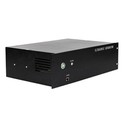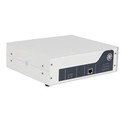Hey there! As a supplier of the ResoLab - 500 Lab Grade Ultrasonicator, I often get asked a bunch of questions about this nifty piece of equipment. One question that pops up quite a bit is, "Does the ResoLab - 500 Lab Grade Ultrasonicator have a data storage function?" Well, let's dig into this topic and find out.
First off, let me give you a bit of background on the ResoLab - 500. It's a top - notch lab - grade ultrasonicator that's used in a variety of scientific and research settings. Whether you're in a biology lab looking to break down cell walls or in a chemistry lab for sample preparation, this machine has got your back. You can check out more details about it here: ResoLab-500 Lab Grade Ultrasonicator.
Now, back to the main question. The ResoLab - 500 does come with a data storage function, and it's actually pretty useful. In a lab environment, keeping track of your experiments is super important. You need to know things like how long you ran the ultrasonicator, at what power levels, and for how many cycles. The data storage feature on the ResoLab - 500 allows you to record all these parameters.
When you start an experiment, you can set up the machine with the specific settings you need, like the amplitude, time, and pulse mode. Once the experiment is running, the ResoLab - 500 starts collecting data. It records details such as the actual power output during the run, the duration of each pulse, and the overall time of the operation. This data is then stored in the machine's internal memory.
The advantage of having this data stored is huge. For one, it provides a clear record of your experiments. If you need to repeat an experiment later or share your findings with colleagues, you can easily access this data. It also helps with quality control. You can review the data to make sure that each experiment was carried out under the same conditions, which is crucial for getting reliable and reproducible results.
Let's say you're working on a long - term project where you're comparing different samples. By using the data storage function, you can compare the results of each sample run based on the recorded parameters. This can help you identify trends and make more informed decisions about your research.
But what if you need to transfer this data to a computer? Well, the ResoLab - 500 has got you covered there too. It comes with a USB port, which allows you to connect the machine to a computer. Once connected, you can easily transfer the stored data to your computer. This makes it even easier to analyze the data using specialized software or to create reports.
Now, I know some of you might be thinking, "What if the internal memory fills up?" That's a valid concern. However, the ResoLab - 500 has a decent amount of internal memory, and you can always delete old data to free up space. Plus, by transferring the data to your computer regularly, you can keep the internal memory from getting too full.
In comparison to other models in our range, like the ResoLab-1000 Lab Grade Ultrasonicator and the ResoLab-2000 Lab Grade Ultrasonicator, the ResoLab - 500's data storage function is quite similar in terms of the basic features. All of our models are designed to help you keep track of your experiments effectively. The main difference lies in the overall power and capacity of the machines, which might affect the type of experiments you can carry out.


Another great thing about the data storage function on the ResoLab - 500 is that it's user - friendly. You don't need to be a tech whiz to access and understand the stored data. The machine has a simple interface that allows you to navigate through the stored data easily. You can view the data in a tabular format, which makes it easy to read and interpret.
In addition to the basic data storage, the ResoLab - 500 also has the option to set up alerts based on certain parameters. For example, you can set an alert if the power output goes above a certain level or if the run time exceeds a set limit. This can be really helpful in preventing any potential issues during your experiments.
If you're still not sure whether the ResoLab - 500 is the right ultrasonicator for you, consider your specific needs. If you're doing small - scale experiments where data recording is important but you don't need a super - high - power machine, the ResoLab - 500 is a great choice. On the other hand, if you're working on larger projects that require more power, you might want to take a look at our other models like the ResoLab - 1000 or ResoLab - 2000.
Overall, the data storage function on the ResoLab - 500 is a valuable addition. It provides a convenient way to keep track of your experiments, ensures reproducibility, and makes data analysis easier. Whether you're a seasoned researcher or just starting out in the lab, having this feature can really enhance your work.
If you're interested in purchasing the ResoLab - 500 or have any more questions about its data storage function or other features, don't hesitate to reach out. We're here to help you make the best decision for your lab needs. Let's start a conversation about how this amazing ultrasonicator can fit into your research workflow.
References
- Manufacturer's manual for ResoLab - 500 Lab Grade Ultrasonicator
- In - house research on the performance of ResoLab - 500 in different lab settings





